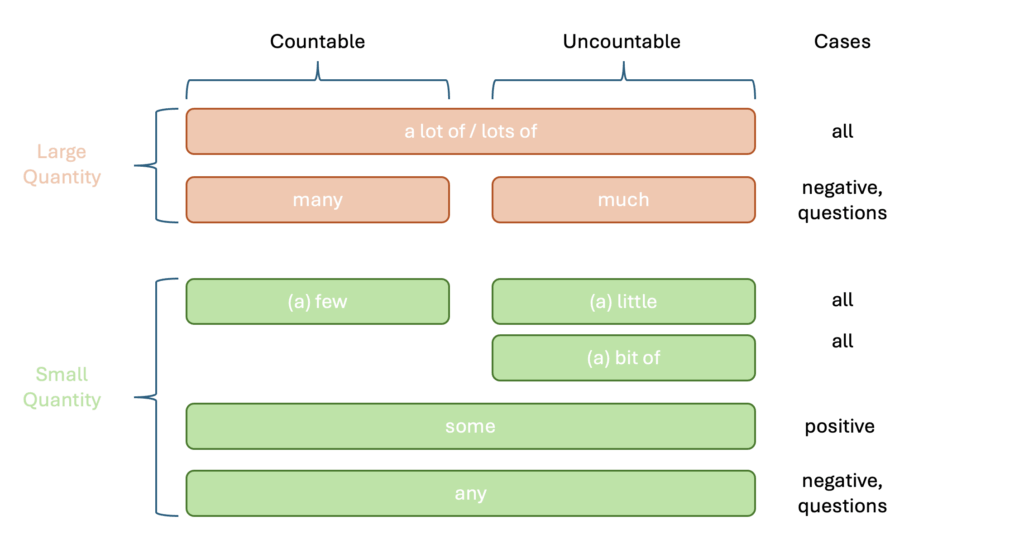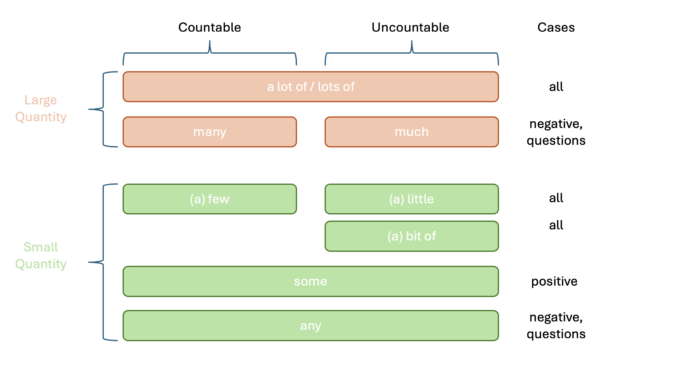Hier wird noch einmal ein Grammatikthema aufgegriffen, mit dem einige gelegentlich kämpfen: wann sagt man much und wann many? Wann little und wann few?
Das Ganze ist gar nicht so trivial, da drei Aspekte des Satzes bzw. worum es in ihm geht berücksichtigt werden müssen:
- Handelt es sich um etwas, das man zählen kann (z. B. book, child, vehicle, also sogenannte countables), oder geht es um etwas Nichtzählbares (z. B. milk, time, effort, sogenannte uncountables)?
- Geht es um eine große oder kleine Menge bzw. Anzahl?
- Ist der Satz eine positive Aussage, eine negative Aussage, oder eine Frage?
Also gar nicht so einfach. Die Grafik bringt Ordnung in dieses Geflecht (sie ist angelehnt an eine Darstellung in english-test.com).

1. Some vs. any
Some wird bei positiven Aussagen benutzt, die sich sowohl auf countables als auch auf uncountables beziehen können, wobei es eher um eine kleine Menge oder Anzahl geht:
He has some friends in Cologne. (friends = countable)
She had some money left on her bank account. (money = uncountable)
Any wird benutzt bei negativen Aussagen (auch wieder in beiden Fällen, countables und uncountables):
He doesn’t have any friends in Cologne. (friends = countable)
She didn’t have any money left on her bank account. (money = uncountable)
Any wird auch in Fragen benutzt (countables und uncountables):
Does he have any friends in Cologne? (friends = countable)
Does she have any money left on her bank account? (money = uncountable)
Keine grammatische Regel ohne Ausnahme: Some wird auch benutzt, wenn man etwas anbietet oder um etwas bittet:
Would you like some coffee?
May I have some coffee, please?
2. Few/little vs. a few/a little
Bei diesen Angaben, die sich auf eine kleine Menge oder Anzahl bezieht, wird nur nach countable und uncountable unterschieden, nicht aber nach der Aussage des Satzes (positiv, negativ oder Frage).
Bei countables (Plural) wird few bzw. a few verwendet:
He has few friends in Cologne. (He moved there many years ago but didn’t befriend many people — in the sense of ‘almost none, not enough’).
He visited a few friends in Cologne. (He visisted a small number of people who belong to his friends — in the sense of ’some but not many, enough’).
She had few things left to do. (There was almost nothing left for her to do).
Bei uncountables wird (a) little bzw. a bit of (informell) verwendet:
He has little money left. (He is almost broke — in the sense of ‘almost nothing, not enough’).
He has a little money left. (He is not totally broke — in the sense of ’some but not much, enough’).
She had little left to do. (There was almost nothing left for her to do).
3. A lot of / lots of
Diese werden bei einer größeren Menge bzw. Anzahl in allen drei Fällen (positive Aussage, negative Aussage und Frage verwendet).
A lot of wird beim Plural von countable und bei uncountable Substantiven verwendet:
I don’t have a lot of time.
I have a lot of time left to do this for you.
Do you have a lot of time for your piano practice?
I don’t have a lot of frieds (lots of friends).
I have a lot of friends (lots of friends) over in Cologne.
Do you have a lot of friends (lots of friends) over in Cologne?
Beim Sonderfall a lot of/lots of am Satzende fällt das of weg:
They had made biscuits and I had lots/a lot.
I like him a lot.
4. Many vs. much
Bei Fragen und negativen Aussagen wird many Substantiven im Plural (countables) und much bei uncountables benutzt.
I don’t have much time.
Did he have much money left?
How much money did you pay for this?
Don’t drink too much milk.
I don’t have many problems with that assignment.
Did he have many helpful neighbours?
How many times have I told you this?
Don’t eat too many biscuits or you will be sick.
Bei positive Aussagen können much und many synonym mit a lot of eingesetzt werden.
I have many / a lot of friends in Cologne.
I had much / a lot of anguish hearing the news.
Übrigens, da wir es gerade mit zählbaren und unzählbaren Dingen zu tun haben:
Falsch: The informations that you sent us in your last email are out of date.
Richtig: The information that you sent us in your last email is out of date.
In English the word “information” is an uncountable noun. You can never, ever, for any reason whatsoever, say “an information” or “informations”. Instead, if you need to use the word in the singular, you can say “a piece / an item of information”. But usually we simply use “information” for both singular and plural.
HaRward Communications

Schreiben Sie einen Kommentar